

The prized possession you value above all others…
My most prized possession is my freedom. I don’t mean to sound flip here, I’m quite serious. Being Jewish, my childhood hero was Moses, who freed my people in ancient times. In elementary school, my favorite book, one that I read over and over, was a biography of Harriet Tubman, who repeatedly risked her life freeing Black slaves from the American South. During my teens in the 1970’s, I struggled so hard within myself to come out as a gay man, to be free. And now, in this country of the United States where I always took my freedom for granted, I find myself worrying to the point of sleeplessness about our President’s support of right-wing, anti-Semitic, racist militias. Without freedom, we have nothing.
The book that holds everlasting resonance…
FAMILIAR FACES, HIDDEN LIVES: The Story of Homosexual Men in America Today by Dr. Howard Brown (1976) is the book that changed my life. I came across it in 1977 in my college library at a time when I was suffering terribly knowing that I was gay and believing the popular notion that “gay” meant “degenerate.” I thought I was destined for a life of loneliness and misery. Then I came across Dr. Brown’s book about the lives of homosexual men. The book showed me that there was nothing wrong being gay, that gay men could live complete, fulfilling lives on their own terms, that we could find friendship and love, that we needn’t lurk in shadows and despise ourselves. That we could—oh my God—be happy.
The happiest moment you will cherish forever…
When closeted in college and intensely lonely, I would go on Saturday nights to the Music building on campus and lock myself in a sound-proofed rehearsal room. While everyone else was partying or at movies or doing whatever else hetero kids did on Saturday nights, I’d sing songs from Cabaret like “Maybe This Time,” and “Come to the Cabaret.” My favorite was “Heiraten,” meaning “married.” In English, the lyrics go something like, “How the world can change, it can change like that, due to one little word—married.”
So…the happiest moment, one I’ll cherish forever, is the day in 2013 when my partner, Leo, and I, each said “I do,” in the Santa Barbara County courthouse before a government official who declared us legally “married.” We wept and kissed one another, in disbelief that our 20-year “engagement” had led to that moment.
The unfulfilled ambition that continues to haunt you…
I always wanted to be a Broadway musical star, just like nearly every other gay boy from the 1970’s! (As an adult, how I enjoyed watching the TV show, Glee.) During high school, I was very involved in theater, an interest that persisted in college. My parents were so afraid that I’d actually pursue acting as a career that they made a deal with me: if I attended law school, they’d then support me for a full year if I wanted to try my hand at acting professionally. Well…they were very smart, my parents: who on earth would struggle for three years in law school only to toss the degree and job security aside in order to risk everything for one of the most iffy careers out there? So, after law school, I dutifully worked as an attorney for many years, only to realize that I was unfulfilled.
When I finally decided to leave the legal profession and pursue fiction writing as a career, I called my father and told him. Silence on the phone, then he said, “I think I’m having a heart attack.” Fortunately, he was mistaken.
Your early recollections of writing fiction…
For me, writing fiction has always been a joyful pursuit. As a child, even before I learned to spell, I’d go down to the basement and plunk out little stories on my mother’s old manual typewriter. During high school, I wrote plays, stories, and poems just for myself because I enjoyed immersing in my imagination. But I never thought of writing as a profession, just as something fun.
Once I realized, as an attorney, that I wanted to switch to writing, I made a deal with myself: if I could complete a draft of a novel and still want to write more, I’d quit my legal job. It took me two years of writing on nights and weekends, but I did complete a draft of a novel (that’s too awful ever to be published), and wanted to write more. So, I handed in my resignation.
The character you enjoyed writing the most…
When I’m writing a given novel or short story, I’m completely invested in that work, in those characters. I couldn’t possibly pick a favorite character out of the hundreds I’ve created over the years. However, thinking about my new collection of short stories, FOREIGN AFFAIRS, one of my favorites is Quinn in the story, “The Importance of Being Jurassic.” Quinn’s an older Irishman who works for the Catholic Church and has remained closeted his entire life, even going so far as to hide his long-term relationship with another man. When his partner dies, in order to get some time off to grieve, Quinn has to tell the Church fathers that his “brother” died. So sad. I think about all the lgbtq closeted people over the centuries who’ve had to hide their relationships and then their grief when losing partners. My heart goes out to all of them and, in the case of my fiction, to Quinn, whom I wish I could embrace and comfort.
And the promo…
Thank you for inviting me to say more about FOREIGN AFFAIRS: MALE TALES OF LUST & LOVE, just out from Rattling Good Yarns Press. This collection of travel-themed stories was many years in the making.
Ever since my teens, I’ve loved to travel—always to see tourist attractions and experience various cultures, often to visit friends or family in other countries, and sometimes to study abroad. It’s of course the local people who provide the greatest source of fascination—how do they think? what do they value? how are they similar to, or different from, us? how do they experience romance…and more?
In previous books, I included characters living in Amsterdam, Buenos Aires, Kiev, and Jerusalem. Those writings whet my appetite to write an entire collection of stories set in countries I’d visited—Mexico, Puerto Rico (a U.S. colony), Ireland, the Czech Republic, Germany, Spain, Portugal, the USSR, Israel. As I wrote, I noticed a pattern emerge among several of the stories—each tale touched on the theme of an American man seeking, experiencing, or trying to understand flirtation, romance, or sex in a foreign locale. With this central theme in mind, I set out to write the remainder of the stories here.
It is my hope that Foreign Affairs: Male Tales of Lust & Love will capture for readers some of the wonder I’ve been lucky to experience while traveling. May we always find connection and joy in our differences.
Thank you.
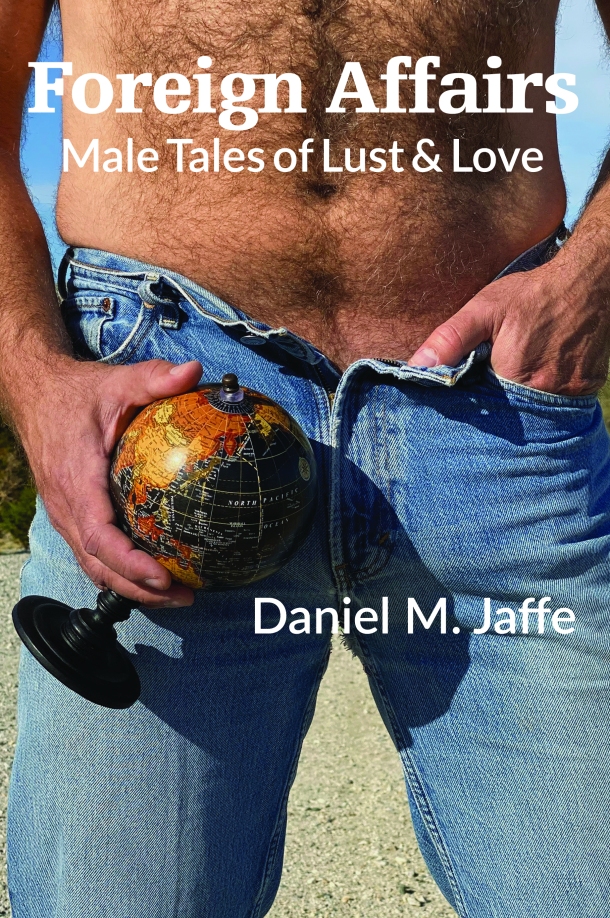
Book Title: Foreign Affairs: Male Tales of Lust & Love
Author: Daniel M. Jaffe
Publisher: Rattling Good Yarns Press
Cover Artist: Ian Henzel
Genre/s: Short stories, literary fiction, LGBT romance
Trope/s: Travel romance, flirtation, sexual encounters, history in contemporary life
Themes: Travel, sexual/gender identity, love, desire, loss,
friendship, historical memory, spirituality
Length: 60 000 words/168 pages
It is a standalone book.
Buy Links
Publisher: Rattling Good Yarns Press
Blurb
In this newest story collection from award-winning writer, Daniel M. Jaffe, red-blooded American men make mischief while vacationing abroad. They encounter a serial killer in a Munich bathhouse, a gay Holocaust ghost in Prague, a shape-shifting seductress in Mexico City, a desperate prostitute in Seville, a closeted Catholic school administrator in Dublin, and many others. These stories will transport, titillate, intrigue, and tug at your heartstrings.
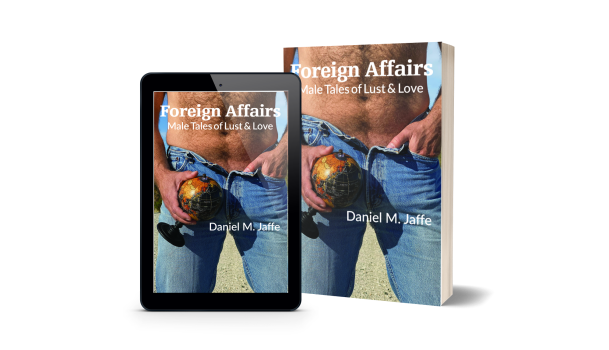

Bill understood Quinn to be whispering “dirty,” but in the raspy, heavy brogue, the word came out as “dehrty”: “Yer a dehrr-ty, dehrr-ty man.” Quinn flicked out his tongue and sucked it in, frog-like. With a thurping sound: “You’re a dehrr-ty, dehrr-ty man,” thurp thurp thurp.
A journalist for the Chicago Tribune, Bill had arrived in Dublin this morning to write a human interest story on the upcoming gay marriage referendum. Polls anticipated Ireland becoming the first country to authorize gay marriage by public vote. Traditional, Catholic Ireland.
Not having slept on the plane—and his body reminding that he was older than he used to be—he spent the day napping in his Jury’s Inn Christchurch hotel room, studying local newspapers and webzines, making notes and listing questions for his article. He supped in his room on take-away from the “great wee chipshop” around the corner, Leo Burdock Fish & Chips—greasy, salty, thick-crusted smoked cod accompanied by more fries than he could possibly consume. Later on, he trimmed his gray beard, donned jeans and a button-down blue shirt that showed off his squarish pecs without appearing too obvious—his decades-old uniform whenever scoping out a new city’s gay life. Bill always enjoyed these forays most of all, surveying the terrain before his newspaper’s photographer arrived and hovered, thereby preventing Bill from conducting his most enjoyable background research.
Passionate encounters with locals were the secret to Bill’s success as human interest story writer—even in his late 50’s, he could still get laid with fair enough regularity, especially as exotic foreigner. Few journalists’ articles contained the under-the-skin insights Bill’s did, revelations feeling like disclosure to a trusted confidant. Bill’s interviews read like intimate pillow talk because that’s precisely what they were.
Bill put little stock in ethical baloney about maintaining journalistic distance: if you want to get an inside story, you need to get inside. Repressed countries were Bill’s specialty because they burst with scared horny locals who had few other bed partner options. Want a journalist to cover police harassment of Russian gay activists? brutality against gays in Iraq? death-threats against gays in Uganda? Send Bill with a pack of condoms to ferret out the under-cover(s) scoop. Only a matter of time before he’d win a Pulitzer. He sure was having fun trying.
Bill headed out in the cool evening for George, the nightclub touted on all Irish gay websites as Dublin’s primary gay hangout. He’d undoubtedly find some trick to “interview.”
Strolling down Dame Street—odd, he thought, how historically grand the word “Dame” sounded in Ireland, whereas in American ears it came across as outdated Al Capone cheap. He walked the narrow sidewalk past restaurants, pubs, cafés, repeatedly bumping shoulders with those walking toward him until he realized that the Irish walked the way they drove—on the left, unlike on-the-right Americans: head-on collisions were inevitable.
A scan around the cobblestone courtyard of Dublin Castle, a mix of red brick Georgian palace, gray medieval fortress, and white-gray Gothic revival chapel. A quick look-see at City Hall with its white-gray granite columns and triangular pediment. On the corner of South Great George’s Street, a main shopping avenue, he faced an enormous mural covering the entire side of a gray building: two young men, one in white sweater, the other in black, snuggling in romantic embrace. Larger-than-life gay love, four stories high. And tacked to a lamppost on the corner beneath it—a bold, green-lettered “Yes For Marriage Equality” poster sporting a rainbow flag. All this smack in the center of Catholic Dublin. A more in-your-face public display than he could recall having seen in Chicago’s Boystown.
That must be the place, with the rainbow flag over the entrance and a thick bouncer staring into Bill’s eye. He nodded at the guy and stepped inside. A low-lit cavernous space with stairs to the right—the upper level looked closed…well, it was a Sunday. The music was fast-paced and louder than he liked. Bill walked to the far end of the long bar with men and women in their 20’s chatting, noted the stage behind the bar, empty now of the drag acts he’d read about. He grabbed a black leather barstool, asked the muscular barman for a pint of Guinness, one of those touristy must-do’s. He savored the thick molasses foam, the mix of bitter and heavy sweet, then turned to the lean young man beside him, a handsome fellow with close-cropped blond hair, and introduced himself, knowing that his accent would lead at least to a where-are-you-from conversation. Bill slapped on his personae of naïve visitor: “All I basically know about Ireland is leprechauns and four-leaf clovers.”
“And all I know about America is that you all carry guns and shoot black teenagers when you’re strung out on crack.”

Daniel M. Jaffe is an award-winning writer whose short stories and personal essays have appeared in over half a dozen countries and several languages. He has been profiled in The Greenwood Encyclopedia of Multiethnic American Literature, and his work has been taught in college and university courses. Daniel is author of the novels Yeled Tov, The Genealogy of Understanding, The Limits of Pleasure, and the short story collection, Jewish Gentle and Other Stories of Gay-Jewish Living. He lives in California with his husband, the writer and professor, Leo Cabranes-Grant.
Read more at www.DanielJaffe.com.
Author Links
Blog/Website | Facebook: Daniel M. Jaffe
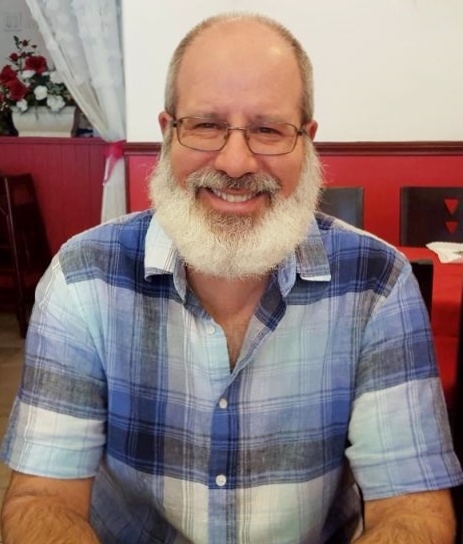
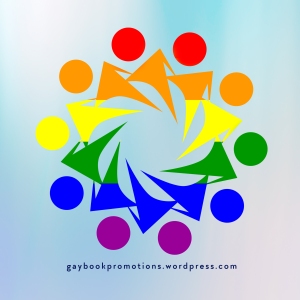
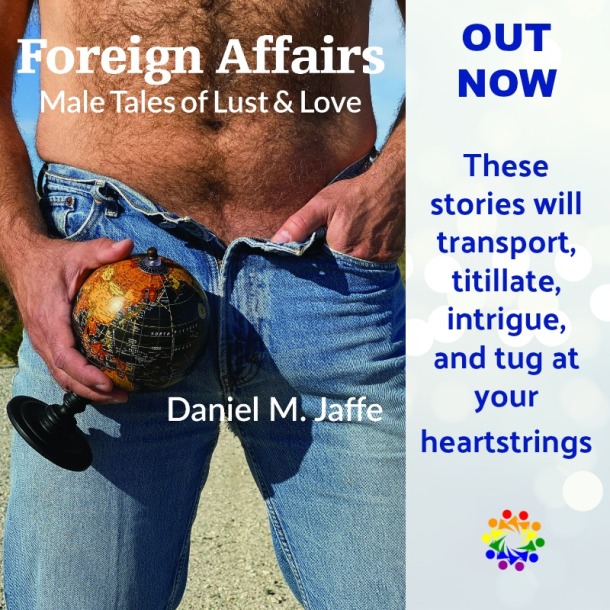
Follow the tour and check out the other blog posts, interviews, and reviews here

I loved the blog post. I would love to read more about this book.